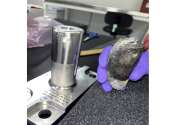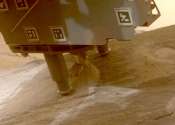The National Aeronautics and Space Administration (NASA, pronounced /ˈnæsə/) is an agency of the United States government, responsible for the nation's public space program. NASA was established by the National Aeronautics and Space Act on July 29, 1958 from its predecessor, the National Advisory Committee for Aeronautics (NACA). NASA has led U.S. efforts for space exploration ever since, resulting in the Apollo missions to the Moon, the Skylab space station, and later the Space Shuttle. Currently NASA is supporting the International Space Station and developing new Ares I and IV launch vehicles.
In addition to the space program, it is also responsible for long-term civilian and military aerospace research. NASA Science is focused on better understanding Earth itself through the Earth Observing System, advancing heliophysics through the efforts of the Science Mission Directorate's Heliophysics Research Program, exploring bodies throughout the Solar System with advanced robotic missions such as New Horizons, and researching astrophysics topics, such as the Big Bang, through the Great Observatories and associated programs. Since February 2006 NASA's self-described mission statement is to "pioneer the future in space exploration, scientific discovery, and aeronautics research."









